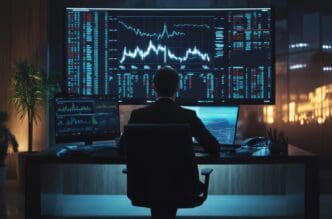Executive Summary
The Story So Far
Why This Matters
Who Thinks What?
Artificial intelligence (AI) is poised to render traditional stock investments obsolete, pushing investors towards Bitcoin, according to analyst and investor Jordi Visser. Speaking on Saturday with Anthony Pompliano, Visser argued that AI’s rapid acceleration of innovation cycles will make slow-moving public companies inefficient investment vehicles, positioning Bitcoin as a more resilient long-term asset.
AI’s Impact on Innovation Cycles
Visser elaborated that if innovation cycles compress to mere weeks, companies will struggle to achieve “escape velocity,” shifting the investment landscape from long-term holding to short-term trading. He suggested that AI could accomplish in just five years what would traditionally take a century.
He characterized this accelerated environment as a “video game” where companies constantly battle for relevance. In such a scenario, Visser questioned the viability of traditional investment approaches.
Bitcoin as an Enduring Belief
In contrast to the fleeting nature of corporate “ideas,” Visser posited that Bitcoin represents a “belief” which, he argued, possesses enduring value. He drew a parallel to gold, noting its ancient longevity compared to the ever-changing constituents of the S&P 500, suggesting Bitcoin will similarly persist.
Visser encouraged investors to “start shorting ideas” and “be long beliefs,” underscoring his conviction that Bitcoin’s fundamental nature as a belief system will ensure its long-term presence in the financial world, regardless of technological shifts.
Ultimately, Visser’s outlook suggests that the transformative power of AI will fundamentally reshape investment strategies, favoring assets like Bitcoin that embody long-lasting beliefs over traditional corporate structures vulnerable to rapid obsolescence.







